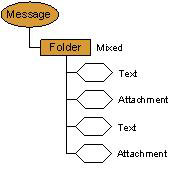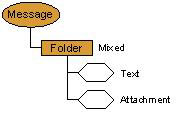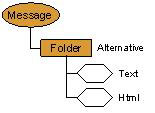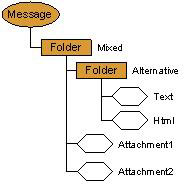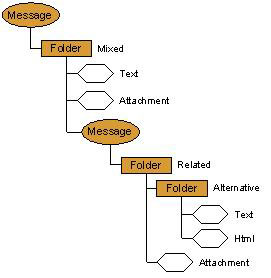Types of Email
This section describes the types of email that Messaging Middleware supports and the structure of email messages.
The following are the types of email that are supported. The diagrams represent the structure of the message entries in the Message Server.
Plain text messages
Non-MIME emails are the simplest type of mail message and contain only a plain text message body.
UUEncoded messages
To allow for binary files to be ‘attached’ to non-MIME emails, it is possible to UUEncode the binary data and include it as text within the message. A typical message would consist of some text, followed by the UUEncoded data, followed by more text and UUEncoded data.
Multipart messages
The multipart messages are the most popular form of modern emails. Multipart messages contain a sequence of body parts which can in turn contain additional nested body parts. The simplest example would be a text message with a single binary attachment. Binary data is typically encoded using BASE64 encoding.
HTML text messages
HTML text messages contain an HTML representation of the message body text (complete with all text formatting) and a corresponding plain text version. The email client can then decide which to display to the user based in its capabilities.
HTML messages with attachments
As with HTML text messages, these contain plain and HTML versions of the body text, as well as additional body parts containing potentially encoded attachment data.
HTML messages with embedded message
Messages can contain embedded messages within their body parts. This example shows a message with parts consisting of plain text, an attachment, and an embedded message. The embedded message in turn contains an attachment as well a plain and html versions of the body text.
Storage of email parts
The majority of the message data is stored within a single file. This contain separate streams for header information, MIME headers, attachment information and the rich text store. If the message contained attachments, a corresponding folder exists that stores each attachment as a separate decoded file.
Copyright ©2010 Nokia Corporation and/or its subsidiary(-ies).
All rights
reserved. Unless otherwise stated, these materials are provided under the terms of the Eclipse Public License
v1.0.

